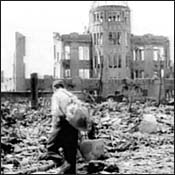


 Email your thoughts
Email your thoughts 
The destruction of Hiroshima
|
The apocalyptic possibilities are multiplying. Will humanity be wiped out by war, plague, a global computer crash or an evolutionary hiccup? Or are we doomed to survive? By Bryan Appleyard.
The Cuban missile crisis of 1962 was one of the most vivid events of my life. As Kennedy and Khrushchev each waited for the other to blink and the masters of war primed their killing machines, I, like millions of other children, had nightmares. Aged 11, I watched in dismay as the adults carried on with their normal lives. Could they not see the horror that was about to be unleashed? Of course they could - they were just as scared as the children - but they could not let their feelings be known. At any moment we might all be vaporised, melted or stricken with terminal radiation sickness. But what language existed to discuss such a possibility? Only the language of nightmares, and good parents tried not to speak that language.
It was a moment when a single political issue - the confrontation between communism and democracy - became utterly, universally personal. The apocalypse united the post-war generation more successfully even than the youth cult that was born at the same time and of the same cultural pressures. The silence of the adults during the Cuban crisis was a version of their incomprehension in the face of mods, rockers, hippies and hell's angels. Either way, they didn't get it: the young's sense that the world they were being offered was deeply inadequate, catastrophically wrong.
Amazingly, it didn't happen: Khrushchev pulled back from the brink. And, 27 years later, communism collapsed. The cold war was finally over and we felt safer. Children now need not have such nightmares.
But if the nuclear threat has, for the moment, receded, the imaginative possibility of the apocalypse has not. How could it? The generation that peered into the Cuban abyss is still around - and anyway, apocalyptic visions have haunted all of human history. In the past they may have been inspired by the fear of avenging gods, the biblical promise of the day of judgment, or simply the resigned sense that all things, the world included, must pass. Science may have allayed some of these forebodings, but it has also created new ones more appropriate to the spirit of the age.
Of these, nuclear weapons were the most dramatic. The scale of their destructive power was, indeed, biblical. Death, as promised in the book of Revelation, would rain down from the heavens, and this time it was accompanied by the more refined killers of shock waves, firestorms and radiation. Those who weren't vaporised in the first seconds or incinerated in the first minutes would perish slowly over the next few days, or freeze and starve in the months of the ensuing "nuclear winter". We had all seen the Hiroshima pictures of human beings reduced, at the moment of death, to shadows, as if that is all they had ever really been.
|